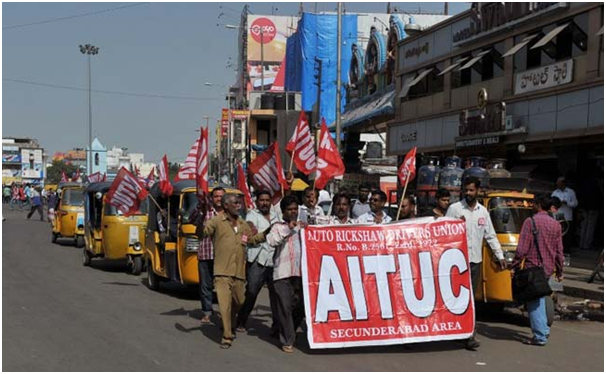Over 15 crore Workers Take to the Streets for Rights and Justice
Workers on strike across India

NEW DELHI: Over 15 crore workers went on nationwide strike to oppose, amongst many issues, the changes in the labour laws by the central government.
In response to a call by central trade unions, employees struck work impacting heavily on banks and transport.
The Bandh received a good response in West Bengal, Kerala, Bengaluru, partly in Mumbai and in New Delhi. Goa, Karnataka and parts of Uttar Pradesh also responded positively to the bandh call. There were impacts of Bandh even in Goa, Karnataka and Uttar Pradesh a bit.
The trade union leaders claimed that the proposed changes in the labour laws will further narrow the scope of opportunities for contract workers. They will also have to work without a social security cover.
Speaking to The Citizen, West Bengal trade union leader Debanjan Chakraborty said, “ The government is trying to cut out all benefits so that we die on the roads. Where are the labour laws that are meant to benefit the whole of the organized and unorganized sector. There is no heed to our demands. The proposed amendments are going to make it worse for us”.
Secretary for the Kerala Chapter of CITU, Nandkumar told The Citizen, “ The Bandh is a huge success in this part of the country. The roads are deserted and no one has gone to work. It is a total chakka Jaam. Our fight is not going to end here, we will take it to every level till our demands are not met.”
A look at the demands of the trade unions versus the responses of the government explains the reason for the strike across India.
The government has proposed “Formula based” minimum wage from rs.7000 per month” according to its calculation placing prices of vegetables Rs.16/kg, Dal Rs.65/kg, Non- Veg Rs.85/kg),Rent Rs.390/per month. Whereas the trade unions are demanding a minimum wage for all as per the 44th Indian Labour Conference(ILC) decision of not less than rs.15000 per month.
The government claims to ensure minimum wages for contract workers. Trade Unions say that minimum wages are already legally guaranteed for contract workers. Their demand is for “same wages and other benefits to contract workers as regular workers for same and similar work.”
Trade unions are demanding that all anti worker labour law amendments are scrapped. This includes those proposed by the centre and enacted by some of the state governments, such as Rajasthan, Maharashtra and Madhya Pradesh which impose legal “slavery.”
A.R.Sindhu, National Secretary, Centre of Indian Trade Unions(CITU) said, “ The response of the Bandh shows that there is ‘No acche din’ and the labour class is suffering the way it was in the past years. We cannot be taken for granted. This is the basic minimum rights that we are talking about and demanding for. The government cannot go ahead with this plan in place”.
Labour laws should be amended to expand coverage and improving labour rights. The trade unions, thus, want the withdrawal of the Prime Ministers Office directive to the states for labour law amendments in line with those adopted by the Rajasthan government.
The government claims that it is considering social security coverage for ‘volunteers’ such as anganwadi, asha and mid day meal workers. The trade unions want steps taken for workers regularisation, minimum wages and pension for all scheme workers as per the decision of the 45th Indian Labour Conference.
Even the written assurance by the GOI in 45th ILC to increase the wage of MDM workers from Rs.1000 per month to Rs.2000 per month has not been implemented. Government has cut down the budget allocations by half for the schemes including ICDS, NHM, MDMS and MNREGA, Trade unions now want full budgetary allocation for the schemes.
The government figures point out that about 2.4 million public sector jobs were lost from 1991 to 2011-12. The trade unions want employment for all.
There is a long list of demands that the government has not even responded to. The strike, the trade unions office bearers said, is the first of what can become a prolonged agitation if their demands are not met.



